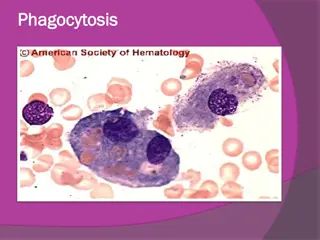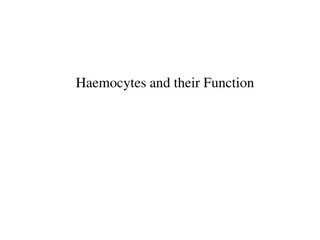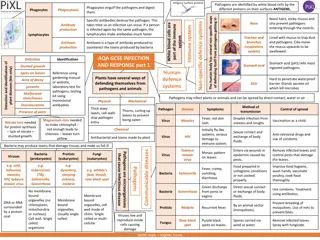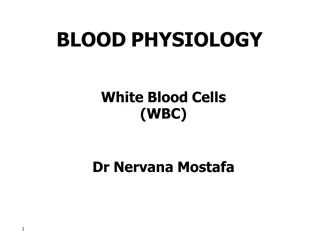Understanding Cellular Events in Inflammation and Repair
Explore the lecture on Cellular Events in Inflammation by Dr. Maha Arafah, focusing on the sequence of vascular changes in acute inflammation, phases of changes in vascular caliber and flow, and objectives covering leukocyte extravasation, chemotaxis, phagocytosis, and microbial killing. Reference m
1 views • 47 slides
Understanding the Importance of the Immune System for Homeostasis
Explore the intricate workings of the immune system, from its component parts and defense mechanisms to the significance of homeostasis maintenance. Discover how non-specific and specific immune responses, phagocytosis, neutrophils, natural killer cells, and interferons play vital roles in protectin
0 views • 32 slides
Understanding Hematopoiesis and White Blood Cells in Blood Formation Process
The process of hematopoiesis involves the lifelong production, multiplication, and specialization of different blood cells in the bone marrow, starting with the stem cells. This process includes the differentiation and proliferation of various progenitor cells, regulated by hematopoietic growth fact
0 views • 27 slides
Understanding Phagocytosis, Inflammation, and Granulomas in Tuberculosis
Phagocytosis is a crucial process where cells engulf and digest pathogens. Inflammation responses involve various immune cells like neutrophils, plasma cells, lymphocytes, and macrophages. Granulomas, typical in diseases like tuberculosis, are mass accumulations in chronic inflammation. Tuberculosis
0 views • 18 slides
Understanding Haemocytes: Types and Functions
Haemocytes are blood cells that play crucial roles in the immune response of insects. They come in different types such as Prohemocytes, Plasmatocytes, and Granulocytes, each with specific characteristics and functions. Prohemocytes are believed to be stem cells giving rise to other cell types, whil
0 views • 9 slides
Understanding Pathogens and Immune Response Mechanisms
Pathogens, such as bacteria, viruses, and fungi, can cause infectious diseases in humans, animals, and plants. The immune system defends against these pathogens through various mechanisms, including the production of antibodies, phagocytosis, and the activation of specific defense cells like white b
0 views • 4 slides
Understanding White Blood Cell Physiology and Function
Explore the formation, maturation, and functions of white blood cells, focusing on eosinophils, basophils, monocytes, and macrophages. Learn about the roles of these cells in immune responses, including phagocytosis, allergic reactions, and defense against parasites. Gain insights into the complex p
0 views • 24 slides






